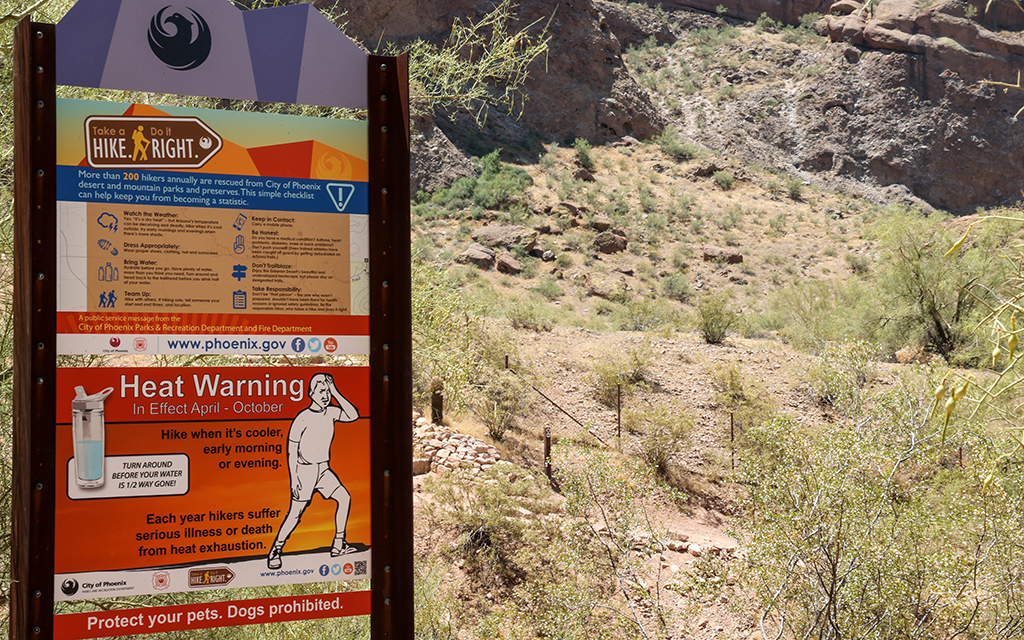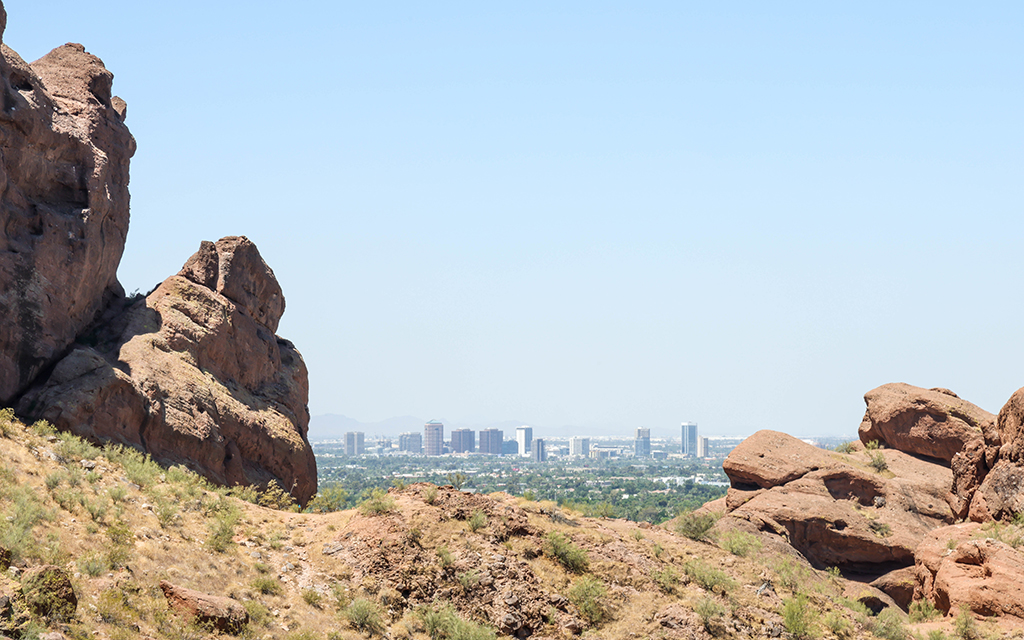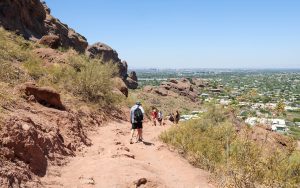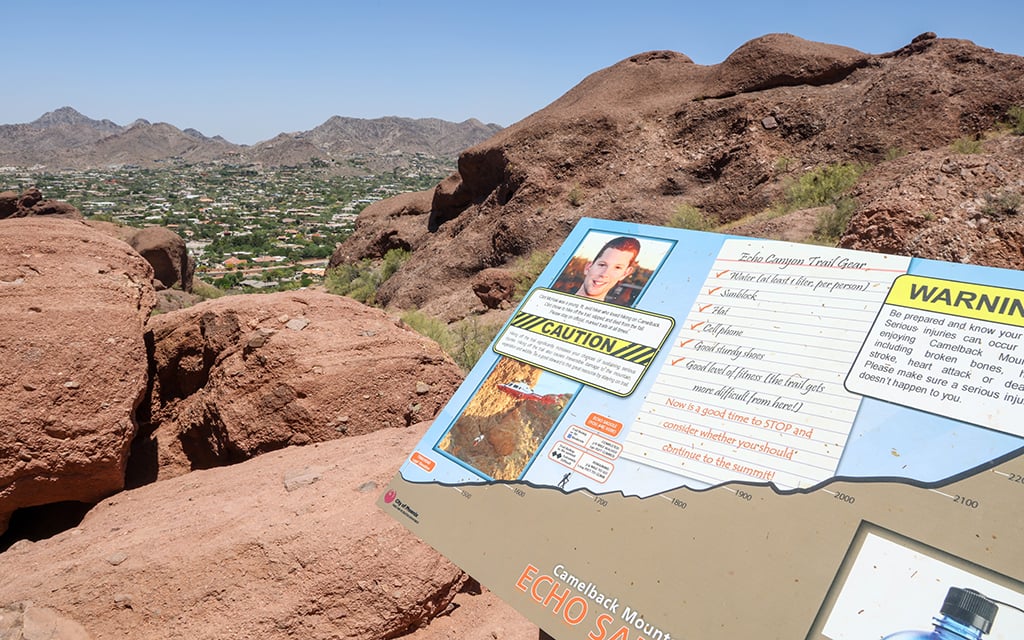
“Take a Hike, Do it Right” signs warn visitors of the dangers while hiking in hot conditions. The city limits hiking on some popular trails from 11 a.m. to 5 p.m. on days the National Weather Service issues an excessive heat warning. (Photo by Evelin Ruelas/Cronkite News)

Camelback Mountain is one of the most popular recreation areas in Phoenix for hikers and fitness enthusiasts. (Photo by Evelin Ruelas/Cronkite News)
PHOENIX – For the past two years, Phoenix officials have closed some of the city’s most popular hiking trails when temperatures have soared to cut down on the number of heat-related incidents – and expensive rescues when hikers get into trouble.
Now, they’re planning to use information they collect this summer to determine whether to make additional adjustments.
In 2021, the Parks and Recreation Board decided to close Camelback Mountain’s Echo and Cholla trails and the Piestewa Peak Summit and associated trails from 11 a.m. to 5 p.m. on days the National Weather Service issued an excessive heat warning.
Last year was the first full season of the trail closure program, which ran from May 1 to Sept. 30, 2022. A March 23 report from Parks and Recreation Director Cynthia Aguilar to the parks board detailed the program’s progress.
Even with the new program, the report showed fire personnel still had to rescue hikers on heat warning days before or after the closure hours: “This illustrates that some hikers get on the trail just before the 11 a.m. trail closure and then find themselves in a dangerous situation as conditions become more extreme the longer they hike.”
The report also noted five heat warning days in April – a popular tourist month – that fell outside the program dates.
So parks board members wanted to know: Should they close the trails at 9 a.m. instead of 11 a.m. on heat warning days, and should they implement the program on heat warning days all year?

People enjoy hiking Camelback Mountain’s trails year-round. One Arizona State University professor says visitors might not be prepared for difficult trails because they’re not used to the climate here. (Photo by Evelin Ruelas/Cronkite News)
Parks and recreation staff surveyed 535 people earlier this year, and the majority of respondents supported the potential changes. But the parks board wants more information before they make a decision.
An Arizona State University professor who has studied the effects of heat on hikers said the city’s trail closure program makes sense, especially because Phoenix has so many visitors who aren’t used to the hot, dry climate.
“We also see a lot of people coming in from other areas that need to check their bucket list and
do a specific hike … normally these people are way less prepared,” said Floris Wardenaar, an assistant professor at Arizona State University’s College of Health Solutions. “Then it definitely makes sense to close off those very hard, difficult trails.”
Wardenaar specializes in performance nutrition. He has conducted multiple studies assessing how the human body performs in the heat.
Wardenaar and others have conducted studies at Tempe Butte. More recently, they analyzed hydration and fluid consumption on hikers at Camelback Mountain. The results, which were published in the International Journal of Environmental Research and Public Health, pointed out that research on hiker physiology is “surprisingly limited.”
“We decided to do it because there’s not a lot of data on energy expenditure and hiking anyways,” he said. “There’s especially not a lot of data coming from hot and dry areas, because most of the areas are humid.”
The researchers studied performance, physiological outcomes and fluid intake. Participants between the ages of 18 and 40 years old ingested a telemetric temperature capsule before their hike so researchers could measure their core temperature.
The study found environmental heat stress impairs hiking performance, increases core temperature and heart rate. Hiking also takes longer under heat stress and requires a greater fluid consumption than hiking in a moderate environment.
Specifically in the heat of Arizona summers, Wardenaar emphasized the importance of fitness and acclimation to heat before setting out on a trail.
“It is always a sort of cost benefit analysis, right? Knowing if you are well trained, if you’re fit, and you’re capable of doing a substantial amount of exercise,” Wardenaar said.
The same summer the trail closure program began, Wardenaar conducted a study at Piestewa Peak, one of the trails closed during excessive heat warnings.

Phoenix, which operates the Camelback Mountain recreation area, installed signs to warn hikers of heat dangers. The city also prohibits dogs on Phoenix trails when the temperature hits 100 degrees or warmer. (Photo by Evelin Ruelas/Cronkite News)
“There was some pushback from the audience because there is a select group of people that really likes to walk in the heat,” he said. “They close it at the strategic hottest moment of the day. To be honest, that makes sense because that is the time that people will suffer the most from heat exposure.”
Wardenaar recommends hiking in the morning before 11 a.m., saying the Arizona desert terrain retains heat throughout the day.
Last year, there were 18 days when the National Weather Service issued an excessive heat warning, and the trails at Camelback and Piestewa were closed, said Adam Waltz, spokesperson for Phoenix Parks and Recreation.
Waltz said they promote hiking safety in a variety of ways, including their “Take a Hike. Do it Right” campaign. They also try to educate the public through social media and newsletters.
The campaign emphasizes that hikers consider weather conditions, dress appropriately, bring water, carry a phone, consider health conditions, stay on the trails, be prepared and hike with a friend.
Wardenaar said hikers need more education on how physical fitness levels, water and the difficulty of hikes can make a difference.
“That’s one of the things we can do better: try to educate people to assess their fitness level and combine it with what condition they are hiking in and how much they should drink,” Wardenaar said. “It’s sort of a triangle, and they all influence each other.”
Phoenix plans to collect more information this summer. Once the 2023 hiking season ends, the parks and recreation department and fire department will propose to the board whether to make additional changes to its program.
Select trails will be open for extended hours this summer to accommodate early morning or late evening hiking when temperatures are cooler.



